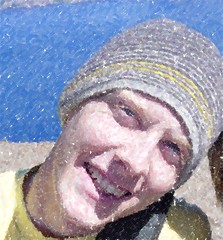The Learning Process
Work has been incredibly busy with the end of the month just 3 days away. Mostly people are asking for Winter curriculum for kids. The other day I received a call from a lady out in Santa Monica, California who is a pastor for a United Methodist church. I had called a few days before and she was returning my call. I wanted to see what her church was using for Sunday School curriculum, especially with children. Even though she was not interested in our material, she and I spoke for about 15 minutes about education. She was telling me how they practice an old method called "the zone of proximal development." This method was produced several years by a Russian who said that people will learn better if they are in the same class with those that have just learned something new. For example, if you have kindergarten who cannot read yet intermixed with a class of 1st graders who just learned how to read, the younger kids will learn have to read more effectively.
I thought this was very interesting and asked her to explain how this effects her Children's Sunday School. She said that they allow they children to express themselves in various ways and find time to talk about their emotions or feelings with adults. The adults are there to listen, not just teach them stories from the Bible. "So many kids can memorize a verse in the Bible or some equation in school," she said, "but they have no idea what it means. The other day a child from another church that I know told me the first verse she just memorized. She began to say John 3:16 perfectly. Afterwards, I praised her efforts and asked what that verse means. The little girl said, 'I don't know.'"
I love to teach. Last year I taught a Sunday School class for college aged kids at a small church. We usually had about 4-8 people in class every Sunday. After the experience, I wondered about how people learn. And if people go to church and school all the time, are all we doing is teaching them information? Maybe there is a different way we can examine the learning process and how it can be shaped to move beyond information to incarnation. Here is an article I found that deals with Children's education, but could definitely be applied to more advanced ages.
I thought this was very interesting and asked her to explain how this effects her Children's Sunday School. She said that they allow they children to express themselves in various ways and find time to talk about their emotions or feelings with adults. The adults are there to listen, not just teach them stories from the Bible. "So many kids can memorize a verse in the Bible or some equation in school," she said, "but they have no idea what it means. The other day a child from another church that I know told me the first verse she just memorized. She began to say John 3:16 perfectly. Afterwards, I praised her efforts and asked what that verse means. The little girl said, 'I don't know.'"
I love to teach. Last year I taught a Sunday School class for college aged kids at a small church. We usually had about 4-8 people in class every Sunday. After the experience, I wondered about how people learn. And if people go to church and school all the time, are all we doing is teaching them information? Maybe there is a different way we can examine the learning process and how it can be shaped to move beyond information to incarnation. Here is an article I found that deals with Children's education, but could definitely be applied to more advanced ages.





<< Home